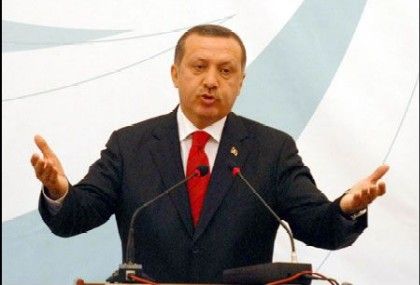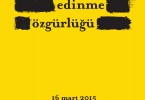News, etc.
Prime Minister Tayyip Erdogan closeted with his ministers and legal experts for four hours putting the final touches to constitutional amendments which he said will be negotiated with all the political parties in Turkey. According to AKP sources quoted by the Turkish newspapers the package of amendments will introduce 12 changes regarding the structure of judicial organs and citizens rights. One of the most important features of the package is related to the structure of the Constitutional Court which has been one of the main headaches of Erdogan since his party came to power in 2002. The number of judges at the Constitutional Court will be increased and part of them will be elected by the National Assembly, according to the amendments. Presently, Turkey’s Constitutional Court has 11 judges, all appointed by the President who selects one of the three candidates nominated by the nation’s top judiciary organs like the Supreme Court.
The amendments will also grant ordinary citizens to file applications with the Constitutional Court, a right reserved until now to the main opposition party, lower courts or 110 parliament members jointly filing a petition.
Closing down of political parties on grounds that their actions have violated the constitution will be adjusted to the norms of Declaration of Venice, according to the draft. The Constitutional Court will not be able to close down political parties unless it is proven that the party is responsible for acts of violence or terror.
Another change concerns the structure of the Supreme Board of Judges and Prosecutors (HSYK) which became the centerpiece of controversy between the government and the opposition recently. Prime Minister Erdogan and his ministers have voiced several times their displeasure with the decisions of HSYK which functions as the supervising body of Turkey’s judiciary, dealing with appointments, promotions and disciplinary measures concerning the judges and prosecutors. Lately, Erdogan implied that HSYK has been overstepping its authority and interfering with the legislative functions of the National Assembly. “The laws are made by the Assembly not HSYK,” he declared.
Members of HSYK are elected by the Supreme Court and High Administrative Court (Danistay) although the justice minister chairs the meetings and their counselors are also become members of the Board. The amendments according to reports will introduce radical changes in the membership structure of the HSYK. The number of HSYK members which is presently seven will be increased to 21. Out of 21, 13 will be elected by the high judiciary organs like the Supreme Court, the Constitutional Court and Danistay. A new mechanism of election will be introduced for all the judges and prosecutors in Turkey to elect 8 members to the board. The President for his turn will nominate 3 members and 3 others will be chosen by the National Assembly. The justice minister and his counselor will continue to be the natural members of the board.
This particular amendment is met with strong reaction from the opposition that claims the measure will “politicize” the judiciary.
The amendments will also introduce “ombudsmanship” in Turkey as a constitutional measure to intercede in conflicts that may arise between the administration and citizens.
The authority of civilian courts to try military personnel for offenses not related to their military duties will also be introduced as a constitutional measure, according to press reports. Other measures include positive discrimination in favor of women, children, disabled and senior citizens as part of Turkey’s effort to adjust its legislation to EU norms.
Article 15 that protects 1980 junta maybe abolished
The package may also include the removal of Article 15 of the Constitution which prohibits any legal action against the military junta that took power on 12 March 1980 as well as the ministers who served under the military rule, some press reports claimed.
The package of constitutional amendments, the newspapers point out, is not final. The information leaked to the press was probably meant to send out feelers to see how the different sections of the Turkish society would react.
The main opposition Republican Peoples Party (CHP) dismissed the amendments as an attempt to undermine the independent judiciary and take it under the control of the National Assembly.
“The real intention of AKP is to put the judiciary under the control of the Assembly. Another point is to make HSYK dysfunctional by allowing the President and the majority of the Assembly, that is Erdogan himself, appoint members to the board. The rest like positive discrimination are mere cosmetic measures,” said CHP spokesman Mustafa Ozyurek.
Selahattin Demirtas, the leader of the Kurdish Peace and Democracy Party (BDP) also voiced his opposition to AKP’s Constitutional amendments package. “AKP is trying to amend the constitution to save itself. We shall not support such changes,” he said.
“This parliament is close to the termination of its legislative term. As such it should not try to introduce a new constitution. A consensus in the society for such a measure is a must,” said Metin Cobanoglu, a spokesman for the rightwing Nationalist Action Party (MHP)
Arithmetic of Constitutional Amendments
According to the 1982 Constitution if more than two thirds of the legislators, that is more than 366 members, vote for the amendments then the President has the right to approve them or submit them to a national referendum. However, if less than 366 legislators approve the amendments then the President has to submit the changes to a national referendum.
AKP controls 337 seats in the National Assembly while CHP has 97 deputies followed by MHP with 69 and BDP 20. There are 11 independents, 6 deputies from Democratic Left Party (DSP) and one from Turkey Party and Democrat Party each with 8 vacancies in the 550-seat National Assembly. That is AKP needs at least 30 more supporters for its amendments to pass without a referendum. Considering the initial reaction from the opposition parties, that seems unlikely. If two thirds of the assembly, which is 330 members, votes to support the amendments then the President has to submit them to popular vote.
It seems the debate over what to do with the 1982 Constitution which practically everybody wants to change will become one of the many open-ended political issues in Turkey.







